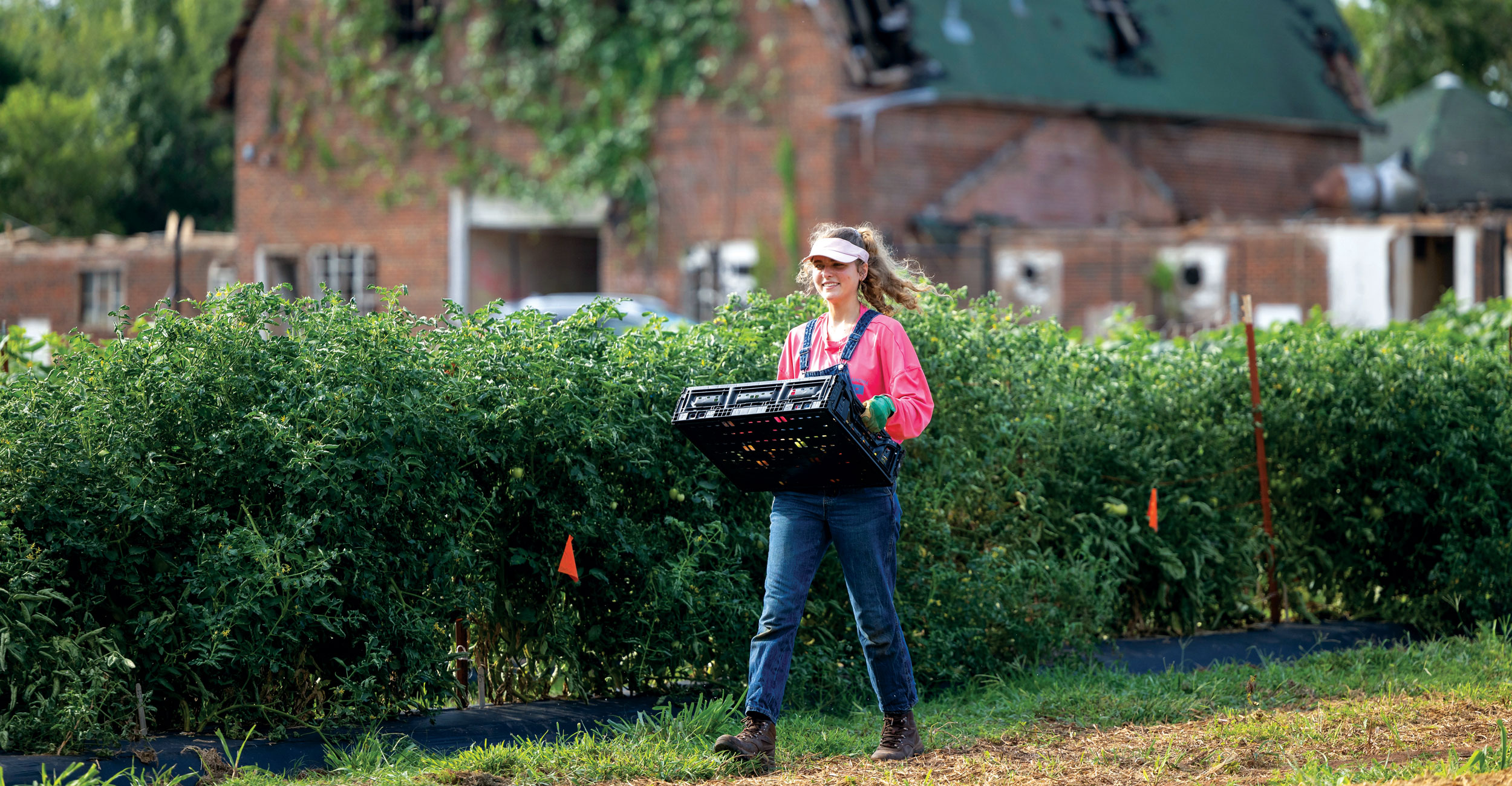
OSU Student Farm is an outdoor classroom with a service-minded mission
Thursday, December 21, 2023
Media Contact: Mack Burke | Associate Director of Media Relations | 405-744-5540 | editor@okstate.edu
In the height of a sweltering summer as the mid-day hours march on, a small group of Oklahoma State University students bend over rows of bright green watermelons, ripe for the picking. It’s above 100 degrees, and their breaks under a nearby shade tree offer little respite from the relentless heat, but they’re happy. They asked to be a part of this.
Sweat running down their backs, soil under their fingernails, they have all become great friends as they work alongside each other on the OSU Student Farm. In early 2023, the commercial garden began growing fruits and vegetables that are delivered to Our Daily Bread Food and Resource Center in Stillwater.
The endeavor is rooted in an idea proposed by Darren Shrum, First Cowboy and husband of OSU President Kayse Shrum.
“The plans for this project reach more than just agriculture,” Darren Shrum said. “All colleges can be involved, from engineering to human sciences, and it ties into the university’s focus on One Health initiative that promotes a healthy lifestyle.”
West of campus on Highway 51, the red brick barn and acreage formerly known as OSU’s Swine Research and Education Center has taken on new life as the Student Farm. In its first year of operation, the site has produced more than 54,000 pounds of produce for Payne County residents on about three acres of land. Last fall, student workers planted cover crops, installed an irrigation system and built a tall, metal deer fence around another three acres the crew will use for planting this spring.
Seven OSU student employees, two managers and several eager volunteers maintain the operation. From cool-season crops to common summer varieties, the team planted many vegetables last year to learn what grew best in the soil. Cucumbers, broccoli, lettuce, tomatoes, green beans, okra, sweet corn, cabbage, kohlrabi, cauliflower, spinach, summer and winter squash, cantaloupes and watermelons were harvested daily.
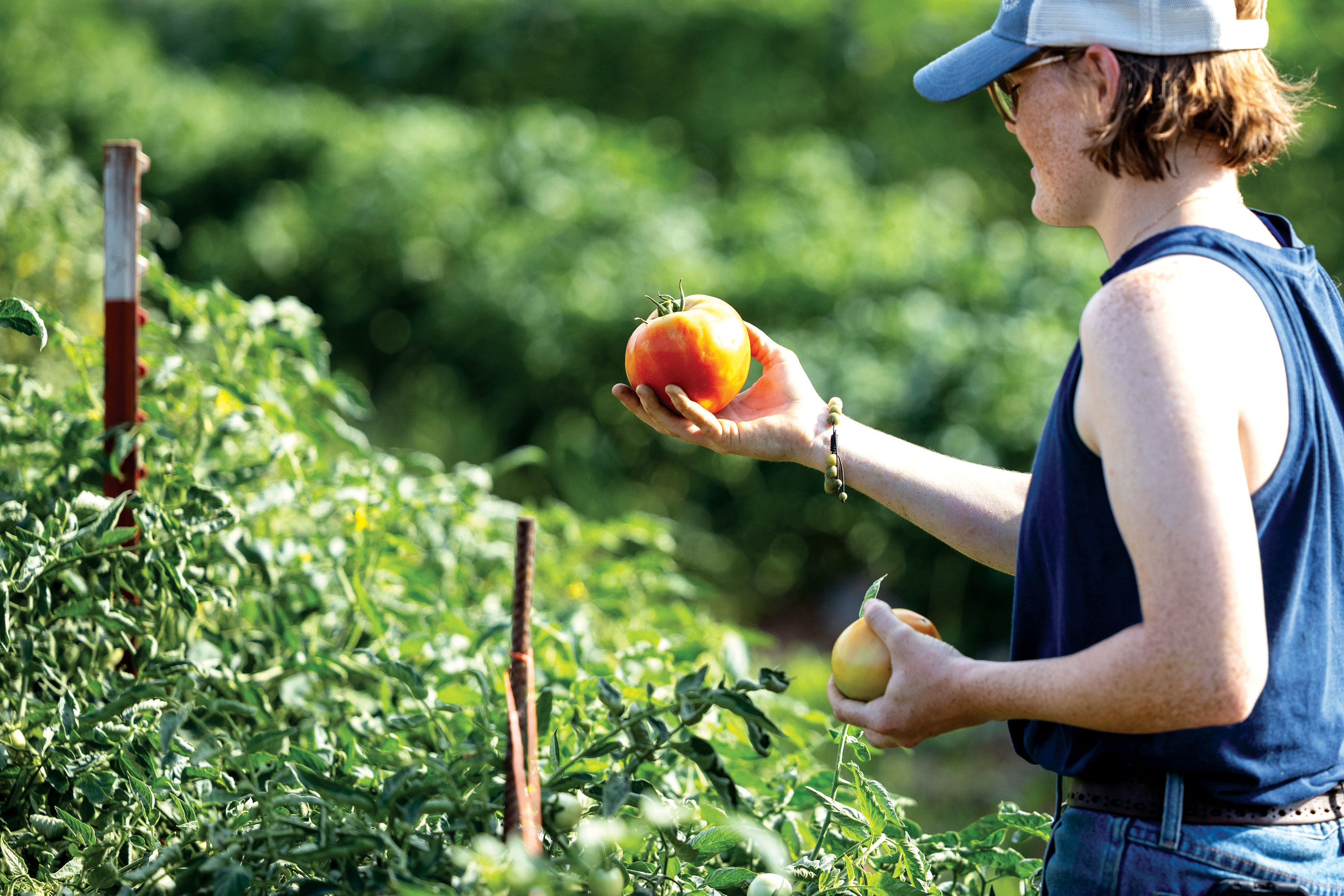
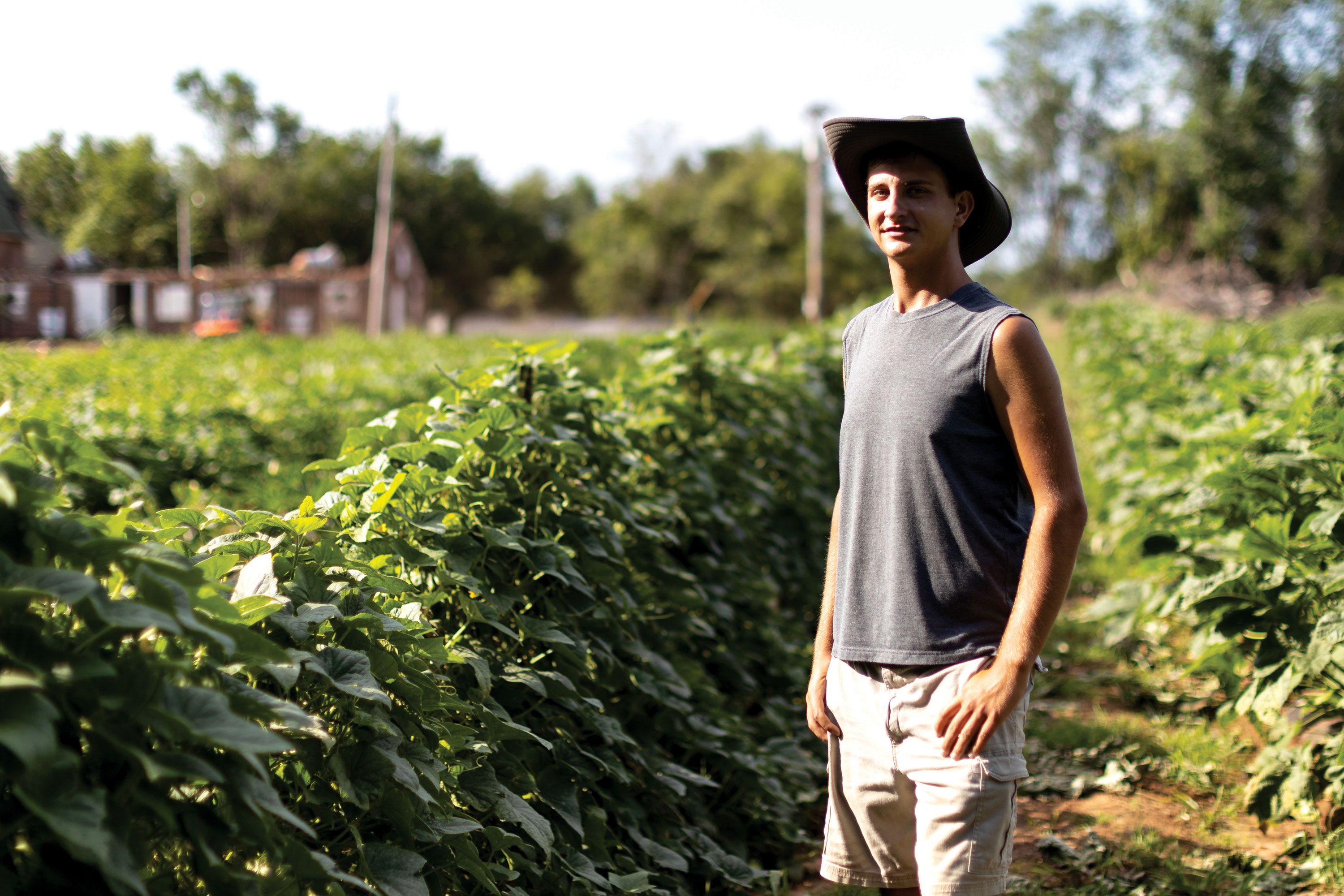
Through hands-on trial-and-error gardening, the crew determined its planting strategy for 2024, which will include new items like potatoes and asparagus.
“Growing produce encompasses many learning opportunities that are related to agriculture, nutrition, soil health, irrigation and the agribusiness sector,” said Dr. Jayson Lusk, vice president and dean of OSU Agriculture. “This unique experience will benefit students far beyond the classroom.”
Doubling the Student Farm’s acreage this year will increase supplies at Our Daily Bread, providing more nutritious food items many residents need but too often can’t afford.
Take What You Need
Inside the food bank, guests push carts down aisles of canned goods, boxed items and freezers of food. The building’s intercom system softly plays upbeat music as shoppers make their selections. Signs taped throughout the room read, “Take what you need,” and a group of people congregate around plastic crates full of fresh vegetables on large tables.
Cushing resident Jacqueline Chappell and her husband visit Our Daily Bread once a month to shop for groceries. As senior citizens on a set income, they must stretch their budget, and that’s difficult with so many medical bills to pay. Chappell has a chronic autoimmune disease, and her husband is battling stage 4 cancer. She is grateful for such an open and giving resource center where she can select the best produce options for their health.
“With the rise in grocery prices, we just can’t make it, and we’re on a fixed diet for our illnesses, so we have to eat a lot of vegetables,” Chappell said. “Canned items have too much salt or sugar. We tried growing a garden, but we’re limited in what we can do. The produce is just a great thing to see. We love the spaghetti squash, peppers and beets, and I made a pie with the pumpkin.”
Previously, other produce that was donated to Our Daily Bread was often near the end of its shelf life, but daily deliveries from the Student Farm guarantee fresh items that support a well-rounded diet.
“Before this partnership, we had very little fresh produce to offer our guests,” said Rachael Condley, executive director of Our Daily Bread. “The accessibility to more vegetables helps guests eat more nutrient-dense foods, and they’re so proud of the meals they’re able to provide their families.”
Our Daily Bread hosts shopping days three days a week featuring the Student Farm’s fresh vegetables and other local donations. Items are also available at other satellite sites: Lincoln Academy, a part of Stillwater Public Schools, and Pete’s Pantry, which serves college students on OSU’s campus.
Embodying the Land-Grant Mission
The Student Farm’s purpose integrates all areas of OSU’s land-grant mission. The project offers valuable teaching opportunities and research projects while embracing the Extension mission, which is deeply rooted in service.
Many of the student workers reached out to Dr. Justin Quetone Moss, head of the OSU Department of Horticulture and Landscape Architecture in the Ferguson College of Agriculture, to ask how they could get involved. Moss advertised the student roles through OSU Career Services and its part-time job fair.
“The OSU Student Farm gives us this wonderful opportunity to give our students hands-on experience in a real-world production environment,” Moss said. “In addition, they are getting involved in the community as they harvest the vegetables daily and directly deliver them to Our Daily Bread each morning.”
One of those students who contacted Moss was Samantha Buie, an agriculture education sophomore from Paso Robles, California, who plans to minor in horticulture.
“He offered me an actual job to provide food for the community,” she said. “I never knew I enjoyed plants or gardening this much until I got the job. I want to be a professor, maybe a horticulture professor, so this definitely has shaped my career path.”
Fellow student employee Samantha Pratt had gained experience in high school working on a family farm in her hometown of Medicine Park, Oklahoma. The public horticulture senior hopes to earn a master’s degree from OSU and eventually teach others about sustainable gardening through botanic illustration.
“It’s great to hear about the impact of the farm,” Pratt said. “I really enjoy the work. I’m a physical person, so being able to put forth my effort toward something that means a lot to people brings me joy.”
Clad in blue jeans, sturdy shoes and gloves, the Student Farm crew is prepared for anything during their shift, and it thrives on the camaraderie developed over the past few months. Buie helped weld the deer fence for the garden’s phase 1 acreage, and it was all hands on deck when setting up the irrigation system. The students run tractors, fix equipment, hoe weeds, drive deliveries to Our Daily Bread and learn the basic steps of establishing and operating a commercial garden.
"Before this partnership, we had very little fresh produce to offer our guests. The accessibility to more vegetables helps guests eat more nutrientdense foods, and they’re so proud of the meals they’re able to provide their families.”
Agriculture education sophomore Rylee Smith from Oologah, Oklahoma, plans to become a high school agriculture teacher, and she believes her Student Farm experience will benefit her students in the future.
“I want to teach students in-depth if they love horticulture,” she said. “If they want to work in it, I can give them that extra knowledge that I’ve learned here.”
Parker Lastovica of Garfield, Arkansas, is a horticulture business senior who knew he was not destined for a career with traditional 8-to-5 hours, tied to a desk. Physical work outdoors for a cause larger than himself changed his perspective.
“Facts I’ve learned in class I can take out here and see them in action,” he said. “I’ve learned a lot of practical information on the day-to-day function of the farm. This is what I want to do — grow vegetables, preferably in a community garden.”
The farm’s co-managers, Lynda Carrier and Matt Beartrack, are wise student mentors. Their combined expertise in research and community gardening is valuable to young students with big dreams of fighting food insecurity, conserving natural resources and promoting public health through physical activity, healthy food and ecological sustainability.
Carrier has 20 years of experience conducting vegetable research at OSU.
“A lot of the plants we did research on over the years were variety trials,” she said. “I looked back through the trials, and we figured out the best varieties to try and grow out here. We had great success with everything we grew.”
Beartrack is an alumnus of the OSU Department of Horticulture and Landscape Architecture and served as the garden manager at Skyline Urban Ministry.
“I have always been a backyard gardener and working here allows me to do what I love while helping out the community,” Beartrack said.
As the Student Farm begins its second year of vegetable production, its dedicated student team is preparing for a busy spring and summer. The seeds and plants they place in the soil, carefully tend and harvest at peak time will nourish thousands of Oklahomans, and that’s not a job they take lightly.
Squashing Stigmas
It’s noon on a Thursday and almost every chair is occupied in the lobby of Stillwater’s Our Daily Bread Resource Center. Guests sit patiently waiting to hear their assigned number called, prompting them to the back of the facility for a grocery shopping session of donated food items and produce.
In the corner of the room, Dea Rash, the OSU Extension Family and Consumer Sciences educator for Payne County, stands beside a table with free samples of spaghetti squash cooked with bacon and cheese. Glossy recipe cards and information sheets are stacked next to the food with notes on how to prepare spaghetti squash and use it in meals. OSU’s Student Farm had an abundance of spaghetti squash this summer, so the goal is to demonstrate how to incorporate it into flavorful meals.
“The main thing is making sure people know how to cook it,” Rash explained. “That’s the disconnect — OSU brought all of this spaghetti squash here, but if someone doesn’t know what to do with it, we want to make sure they go home with instructions on how to cook it several different ways.”
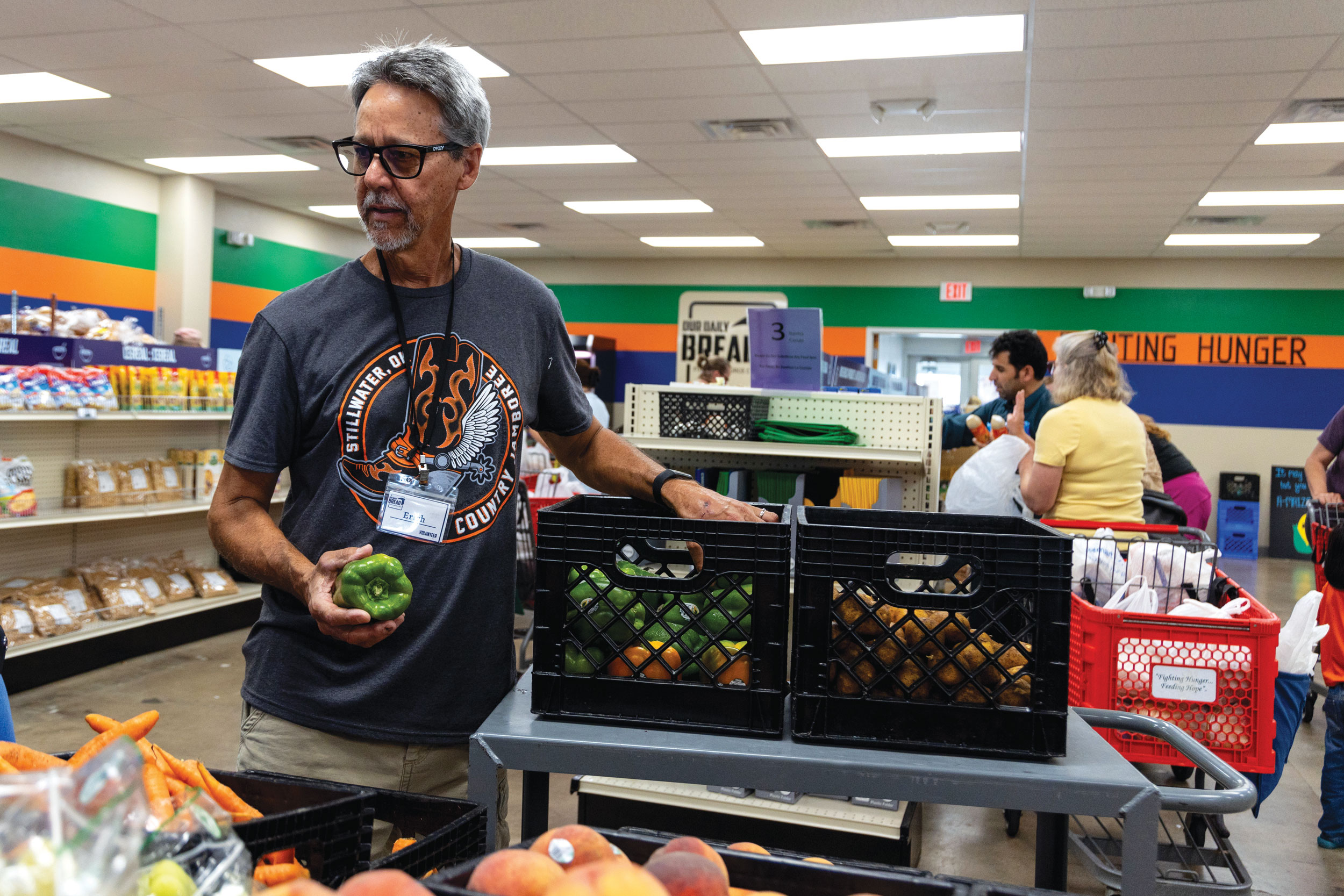
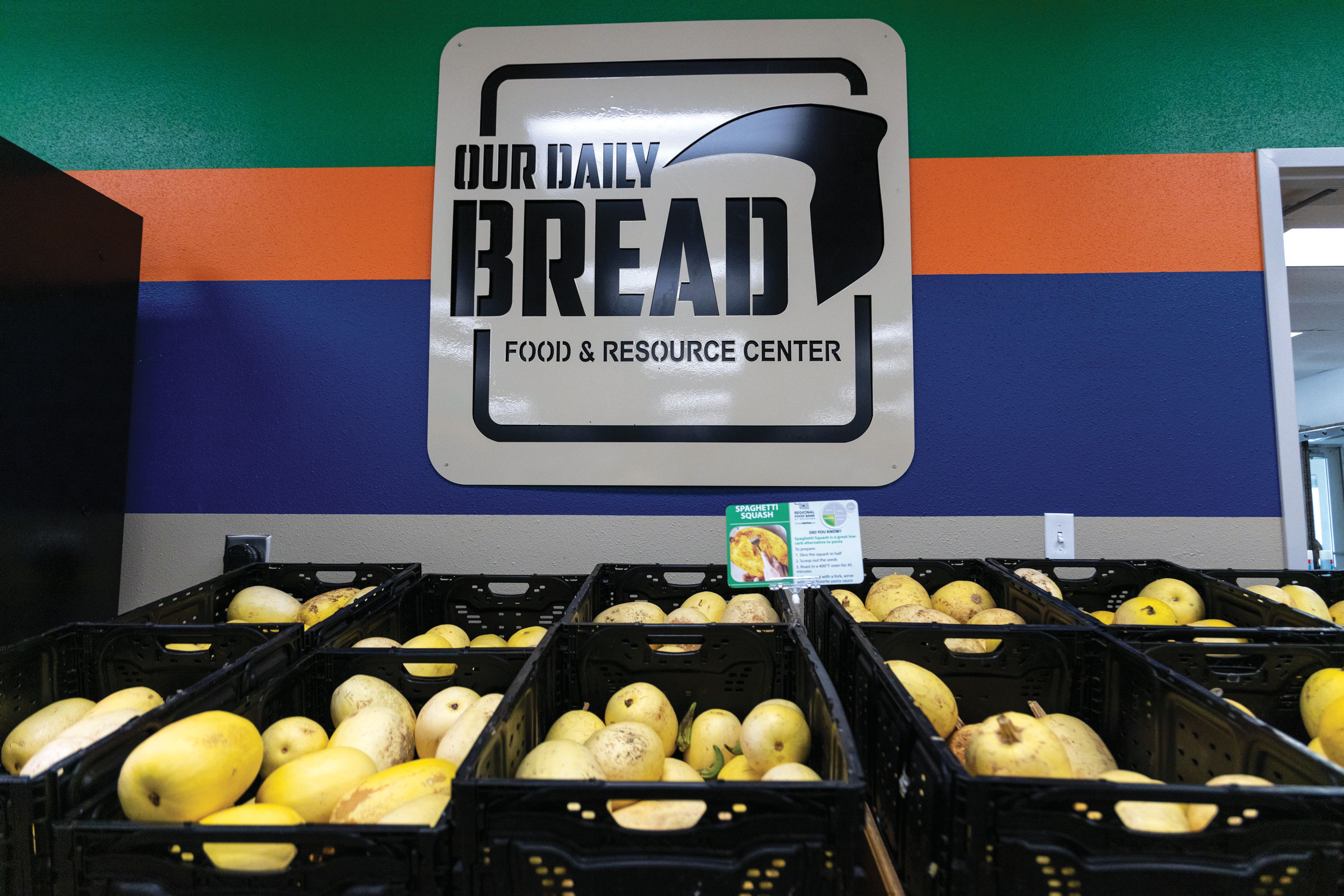
Rash regularly visits Our Daily Bread on shopping days to represent OSU Extension as an extra layer of community support. She hosts educational programs for residents that promote eating nutrient-dense foods and healthy lifestyles.
Every method and concept is backed by research, and nutritional information is available with the recipes.
“We’ve taught classes on cooking with cast iron skillets, STEM programming, jam making, pressure cooking and air fryers,” Rash said. “People might be interested in a class like that here, so it’s good to be a presence and promote the classes we offer.”
Rash plans to continue coordinating demonstrations with Our Daily Bread and the Student Farm; the produce harvested later this year will help Payne County Extension determine what recipes and cooking methods to share with the community.
OSU Extension offices are in all 77 Oklahoma counties. To connect with local educators like Rash, visit extension.okstate.edu.
Photos by: Mitchell Alcala
Story by: Gail Ellis | STATE Magazine
